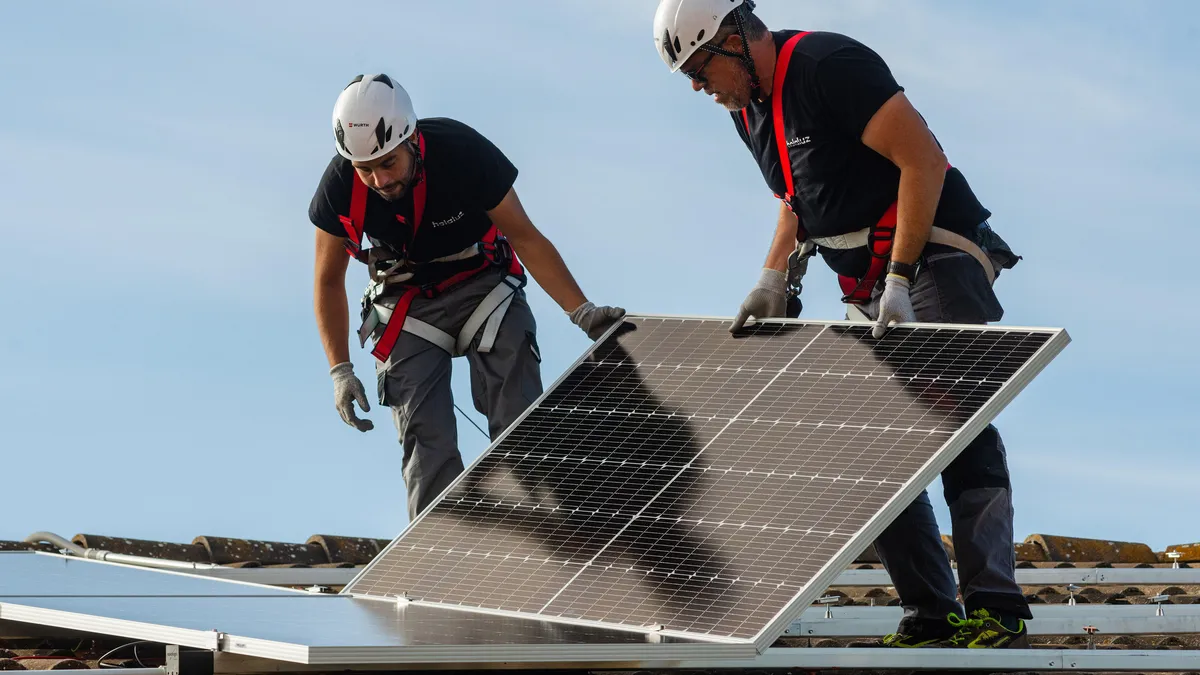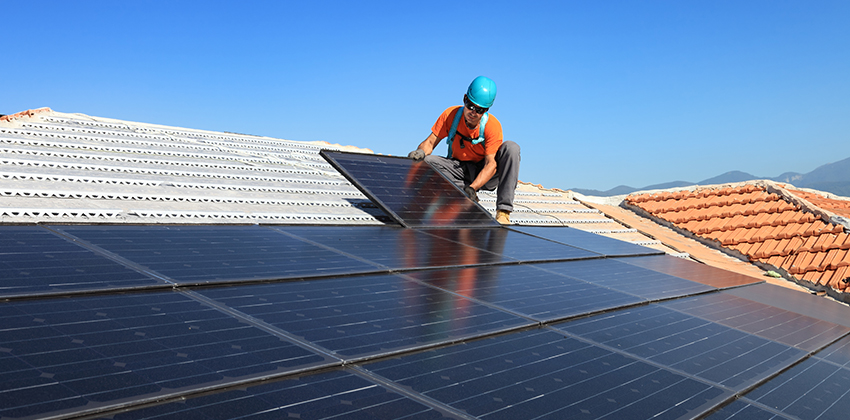The Crucial Overview to Solar Panels Installment: What You Need to Know
The installation of solar panels is a considerable decision for organizations and homeowners alike. It includes recognizing different panel kinds and examining specific power needs. In addition, a detailed site analysis and knowledge of regional regulations are necessary. Selecting a certified installer and understanding the installation process can considerably affect the end result. As the demand for solar power grows, steering with these aspects becomes increasingly essential. What actions should one require to ensure an effective setup?
Comprehending Photovoltaic Panel Types
Solar panels, an essential part of renewable resource systems, been available in numerous types, each with special characteristics and advantages. The most usual kinds are monocrystalline, polycrystalline, and thin-film photovoltaic panels. Monocrystalline panels, made from single-crystal silicon, are understood for their high performance and small layout, making them perfect for restricted area. Polycrystalline panels, composed of multiple silicon crystals, use an even more cost-efficient service however typically have a little reduced efficiency compared to their monocrystalline equivalents. Thin-film photovoltaic panels, made from a selection of materials, are light-weight and versatile, permitting flexible installation choices; however, they generally call for more room to produce the exact same amount of energy. Each kind of photovoltaic panel has its very own benefits and disadvantages, which can affect the decision-making process for potential customers, relying on their specific demands, budget plan, and installation problems.
Examining Your Energy Requirements
Prior to selecting the appropriate sort of solar panel, individuals have to examine their power requires to assure a reliable and reliable system. This evaluation usually includes analyzing past electrical power expenses to comprehend average month-to-month usage. By determining top use times and the total kilowatt-hours eaten, individuals can better establish the needed capacity of their photovoltaic panel system.
Furthermore, factor to consider ought to be provided to future energy demands, such as potential home growths or the addition of electrical cars (Solar Company). Individuals ought to likewise make up energy performance measures already in place, as these can notably affect total consumption
A complete understanding of power needs not only help in picking the best photovoltaic panel type yet also notifies choices concerning system size, inverter specs, and battery storage space alternatives. Properly examining power needs ultimately results in a much more customized and reliable solar service, making certain that the installation meets both future and present needs.
The Value of Website Assessment
A complete website analysis is vital for the successful installation of solar panels. This evaluation evaluates various elements that add to the effectiveness and performance of the solar power system. Trick parts include examining roof positioning, tilt, and shading, along with reviewing the architectural stability of the installation surface. In addition, regional climate problems play a considerable function in identifying photovoltaic panel performance; regions with bountiful sunshine are perfect candidates for solar energy systems.
Understanding the offered room for panel installation is necessary, as it straight influences power generation capacity. An in-depth website evaluation likewise helps in identifying possible challenges, such as nearby trees or structures that might obstruct sunlight. Ultimately, a detailed site analysis guarantees optimum positioning, maximizes power outcome, and assists home owners make informed decisions concerning their photovoltaic panel systems (Solar Company). This fundamental step is important for understanding the long-lasting benefits of solar power
Browsing Authorizations and Regulations
Exactly how can home owners effectively browse the complicated landscape of guidelines and permits when setting up solar panels? Initially, they should look into regional zoning laws and building codes, as these can vary significantly by town. House owners must contact their regional government or planning division to determine necessary licenses, which usually consist of electrical and structural approvals.
Additionally, recognizing reward programs and solar power policies at state and government degrees can provide monetary alleviation and simplify the installation process. Engaging with local solar organizations or campaigning for teams can supply important understandings and sources.
Homeowners are additionally encouraged to seek advice from specialists who concentrate on solar setups, as they are typically acquainted with the regulatory framework. By proactively attending to these demands, property owners can guarantee conformity and prevent prospective hold-ups, facilitating a smoother shift to solar power.
Picking the Right Installer
Choosing the right installer for solar panels is important for an effective installation. People ought to validate the installer's qualifications and licenses, assess their experience and competence, and contrast quotes and solutions supplied. This mindful analysis warranties that home owners make educated decisions that straighten with their energy objectives.
Verify Accreditations and Licenses
When thinking about photovoltaic panel setup, one important aspect usually neglected is the confirmation of licenses and accreditations held by possible installers. Proper qualifications assure that the installer adheres to market criteria and guidelines, which can significantly influence the quality and safety of the setup. Installers need to possess pertinent certifications, such as those from the North American Board of Licensed Power Experts (NABCEP), indicating an acknowledged degree of expertise. In addition, validating state or local licenses confirms that the installer is accredited to run in the area and complies with regional laws. Prospective consumers ought to likewise inspect for insurance policy protection to shield against prospective obligations throughout the installation process. Completely vetting these qualifications assists ensure an effective solar panel setup.
Examine Experience and Knowledge
Assessing the experience and know-how of possible solar panel installers is necessary for ensuring a high-quality installation. Homeowners should look for installers with a tested record in solar panel projects, as this highlights their capacity to handle numerous challenges that might emerge throughout installation. Furthermore, experience in regional policies and allowing procedures can enhance the project and prevent hold-ups. It is suggested to ask regarding the number of setups completed, the types of systems set up, and any customized training the installers have undergone. Customer endorsements and evaluations can supply additional understanding into the Continued installer's reliability and workmanship. Ultimately, choosing an installer with significant experience and competence can substantially affect the overall success and long life of the photovoltaic panel system.
Contrast Quotes and Providers
After reviewing the experience and know-how of prospective solar panel installers, the following crucial step entails comparing solutions and quotes to make an informed choice. House owners must gather numerous quotes from different companies, guaranteeing they represent the complete price, consisting of devices, installation, and any additional costs. It is necessary to recognize what each quote covers, as some may include guarantees, upkeep strategies, or funding alternatives that others do not. Furthermore, house owners should take into consideration the reputation and consumer testimonials of each installer, as quality of service can differ considerably. By meticulously contrasting these variables, individuals can pick an installer that not just fits their spending plan yet likewise meets their requirements for high quality and reliability.
Installment Process Overview

The installation process of solar panels starts with a complete site assessment to review the suitability my site of the area. Following this, an in-depth malfunction of the installation steps lays out exactly how the panels will be safely installed and connected. Recognizing these components is crucial for a effective and reliable installment.
Website Evaluation Procedures
An extensive site analysis is crucial for the successful installation of photovoltaic panels, as it figures out the suitability of a place for using solar power. This procedure normally starts with evaluating the physical area, consisting of why not try here roof alignment, size, and angle, to ensure ideal sunlight exposure. In addition, possible shielding from close-by trees, structures, or various other blockages have to be identified, as it can significantly affect power production. The structural stability of the installation website is additionally evaluated to validate that it can sustain the weight and installation of the solar panels. In addition, neighborhood regulations and zoning laws are checked out to guarantee compliance. Generally, a detailed website analysis lays the foundation for an effective photovoltaic panel installation task.
Installation Steps Break Down
Successful solar panel installation involves numerous vital actions that protect a effective and effective arrangement. A specialist team will perform a thorough site assessment to establish the perfect positioning and alignment of the panels. Following this, the installation starts with mounting the solar panel racks firmly on the roofing system or ground. Next, the panels are connected to the mounting system, ensuring they are effectively aligned. Once in location, the electrical wiring is set up, connecting the panels to the inverter and electric system. After validating all links, the system goes through extensive testing to confirm functionality and safety. Lastly, the installation ends with getting necessary authorizations and assessments, allowing the system to be activated for usage.
Upkeep and Surveillance of Solar Panels
Although solar panels are developed to be low-maintenance and long lasting, normal maintenance and tracking are vital to assure peak performance and long life. Routine inspections help recognize problems such as dust build-up, shading from close-by trees, or damages from weather occasions. Cleansing panels regularly assures optimum sunshine absorption, while resolving any blockages can boost effectiveness.

Often Asked Inquiries
What Are the Financial Incentives for Setting Up Solar Panels?
Financial incentives for mounting solar panels include tax credit scores, rebates, internet metering benefits, and renewable resource certifications. These motivations can considerably minimize initial costs, boost return on investment, and promote sustainable energy use for companies and property owners alike.
How Much Time Do Solar Panels Usually Last?
Solar panels commonly last between 25 to three decades, depending upon their high quality and upkeep. Many manufacturers supply service warranties for this duration, making certain dependable performance and power manufacturing throughout their operational lifespan.
Can I Set Up Solar Panels Myself?
Yes, individuals can mount solar panels themselves if they have the needed skills and devices. However, it is necessary to understand regional regulations, safety and security considerations, and prospective influences on service warranties before continuing with a do it yourself installation.
What Occurs During a Power Failure With Solar Panels?
Throughout a power failure, solar panels normally quit generating electrical energy unless outfitted with a battery storage system or a back-up inverter. This protects against backfeeding right into the grid, ensuring security for energy workers and the surrounding community.
Exactly How Do Solar Panels Affect Home Value?
Solar panels usually boost home worth by boosting power performance and lowering power costs. Prospective purchasers frequently view solar setups as desirable investments, resulting in higher offers and quicker sales in affordable realty markets.
Thin-film solar panels, made from a range of products, are light-weight and versatile, permitting for flexible installation choices; nonetheless, they typically call for more area to produce the very same amount of energy. When thinking about solar panel setup, one important factor typically forgot is the verification of qualifications and licenses held by prospective installers. Examining the experience and competence of potential solar panel installers is essential for making certain a top notch installation. A complete site evaluation is vital for the effective installation of solar panels, as it establishes the viability of an area for using solar power. The architectural integrity of the installation site is likewise analyzed to confirm that it can support the weight and installation of the solar panels.